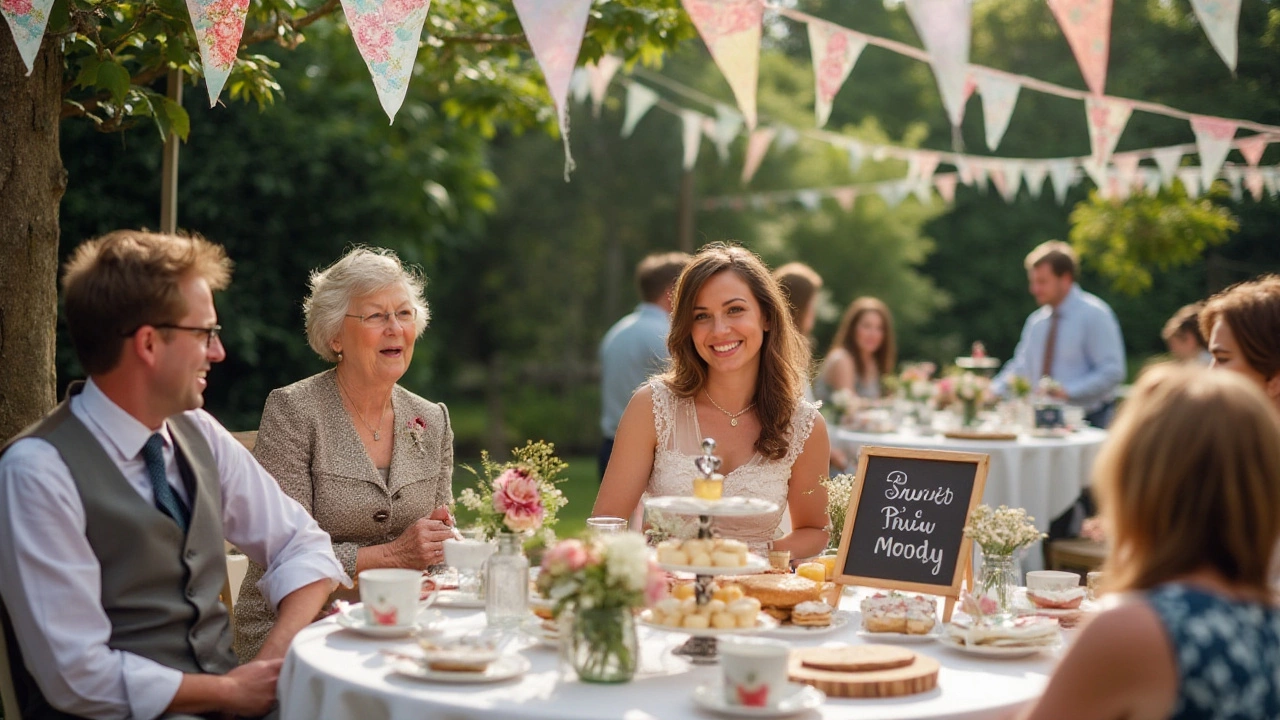Planning a wedding is much like conducting a grand symphony—complex, filled with harmonies, and sometimes, a little discord. When you're navigating through bridal showers and wedding invitations, the question of whether it's impolite to invite someone to a shower but not the wedding itself often comes up. It's a topic that tiptoes on the lines of tradition and modernity, each with its own set of expectations.
As weddings evolve, so do the norms surrounding them. Budget constraints might mean you can't invite everyone to both events, and that's okay. What's important is understanding the etiquette, the delicate dance of social expectations, and managing these with tact and sincerity.
This exploration isn't just about rules; it's about the people you care about and the connections that matter. By delving into the nuances of contemporary wedding practices and combining them with a sprinkle of timeless advice, you'll find a path that feels right for your special day.
- Understanding Traditional Etiquette
- Modern Wedding Trends and Expectations
- Balancing Budgets and Guest Lists
- Navigating Potential Hurt Feelings
- Communicating Clearly and Graciously
- Practical Tips for Organizing Celebrations
Understanding Traditional Etiquette
When it comes to weddings, understanding the traditional etiquette surrounding invitations is akin to knowing the rules of an age-old dance. For time immemorial, weddings have been events steeped in custom, with each aspect adhering to an unofficial code of conduct that was expected to be followed by both the hosts and the guests. Traditionally, the etiquette dictated a clear line between formal and informal gatherings; bridal showers, while intimate and special, were typically reserved for close friends and family who would also be present on the big day. The underlying notion was simple yet profound: a bridal shower was to celebrate and honor the bride, and logically, those who were celebrating her would also be witnesses to her nuptials.
Back in a time when weddings were smaller, more community-centric affairs, the guest lists were far less expansive than what we see today. This automatically ensured that guests at pre-wedding celebrations, like bridal showers, were usually expected to attend the main event. However, the logistics of modern celebrations have significantly altered this tradition. While the past called for strict adherence to these so-called rules, contemporary times emphasize personalization and practicality more than ever. Acknowledging this shift is crucial to understanding why the rigid customs of yesteryears might see reinterpretation in today's context.
The Evolution of Expectations
In historical practices, invitations were often hand-delivered with great ceremony, and the inclusion of a person in such a celebration was viewed as a mark of honor and respect. Ladies of society took great care in ensuring that their guest lists were reflective of their familial ties and social standings. In that sense, the invitation was more than reading the momentary pleasure of someone's company; it was about binding ties and forging alliances. Despite the evolution in style and substance, remnants of this tradition still linger. As Emily Post famously encapsulated, "Etiquette is the science of living. It embraces everything. It is ethics. It is honor." Such ideals stress the importance of everyone feeling valued and appreciated, a sentiment that remains at the heart of wedding invitations today."Etiquette is the science of living. It embraces everything. It is ethics. It is honor." - Emily Post
Balancing Tradition with Modern Sensibilities
Today, while the essence remains, there are allowances for changes brought forth by the demands of contemporary living. The factors of financial constraints, larger social circles, and logistic considerations weigh heavily on planning decisions. It is no longer uncommon to see separate guest lists for different events across the wedding timeline. Couples today strive to strike a balance that does not alienate friends and family, yet keeps the celebrations meaningful and within budget.Wedding invitations, in essence, have always been about extending warmth, respect, and a desire to share intimate moments. Understanding and potentially deviating from tradition isn't about disregarding these values but about embracing the diversity and complexities of the lives we lead today. As we delve deeper into the world of bridal showers and wedding invitations, we come to appreciate both the foundation laid by traditions and the flexibility allowed by modern sensibilities. In the end, it is this blend that is paving the way for the weddings of tomorrow.
Modern Wedding Trends and Expectations
The landscape of weddings has drastically shifted over the past few decades, with modern trends reshaping what people expect from these once-standardized ceremonies. Wedding invitations and the social cues they represent have not been spared from this transformation, morphing as couples increasingly prioritize personal expression and cultural diversity over traditional norms. In recent years, many couples have opted for intimate ceremonies, choosing to invest more in personal touches rather than adhering to the expansive celebrations expected in the past. This shift is largely driven by financial considerations as well as a desire for authenticity and deeper connections with guests. While some might fear appearing rude by excluding someone from the main event after inviting them to a shower, when explained properly, it's often merely a reflection of new priorities.
Recent statistics indicate that the average cost of a wedding in the United States has climbed to over $28,000, prompting many to downsize and seek alternatives. Couples are leaning towards events that genuinely reflect their values—be it eco-friendly choices, unique venues, or unconventional entertainment. This personalized approach recalibrates expectations and encourages a broader understanding of what a wedding could entail. Invitation lists are becoming more fluid, often tailored to include different circles of friends and family for varied segments of the celebrations. This might mean inviting colleagues to a casual bridal shower, while reserving the wedding ceremony itself for immediate family and closest friends.
"The essence of a wedding is shifting from grandiose public displays to intimate moments shared with those who truly matter," notes Martha Stewart, a prominent figure in the lifestyle and events industry. "As couples reflect on what they truly value, they craft celebrations that echo their unique stories, not just those weighted by tradition."
Social media and digital innovation have also played a role in this evolution, providing platforms for couples to share their joy with a wider audience, even if not everyone can attend every event. Virtual wedding experiences, live streams, and digital invitations are becoming standard, allowing guests to participate in a way that suits their availability and preference. This digital approach not only expands access to the celebration but also reduces costs and environmental impact. As these trends continue to develop, there remains a culture of flexibility and open-mindedness, with traditional expectations giving way to a more diverse array of celebration formats. Bridal showers, therefore, form part of a tapestry of celebrations rather than a precursor or predictor of an invite to a future ceremony.
Ultimately, those planning weddings today should feel empowered to forge their own path, balancing respect for tradition with the desire to craft meaningful, personalized experiences. Communication is key—ensuring that guests understand the reasons behind specific choices, and using these modern platforms to enhance and clarify expectations. As you navigate the shifting sands of wedding invitations and related events, knowledge, and compassion remain your trusted allies. The art is in blending the old with the new, and in doing so, reshaping what it means to celebrate love in today's world.

Balancing Budgets and Guest Lists
The intersection of love and logistics often reveals itself most prominently in the wedding planning process. One of the trickiest aspects is managing a budget while curating a guest list that pleases both personal sentiments and social obligations. Most couples face this delightful yet daunting task as they approach their big day. In 2023, the average cost of a wedding in the United States was $28,000, according to data from The Knot. Such figures can give one pause, prompting a closer look at who truly fits into the celebration picture.
Wedding invitations embody more than mere gestures—they are signals of closeness, tokens of shared histories, and potential bridges to future ties. Hence, the final list deserves careful consideration. Many factors weigh into this decision: venue size, cultural expectations, travel logistics, and, notably, the budget. Prioritizing these elements is indispensable for drafting a list that feels both inclusive and manageable. Drawing a clear line between those who will attend the ceremony and those invited only to the shower is not only practical but sometimes essential. To manage your guest list effectively, it might help to categorize potential guests into tiers, starting with immediate family and closest friends.
Money may not buy happiness, but it certainly dictates guest-list dynamics. Budget restrictions might transform a sprawling celebration into a more intimate affair, prompting difficult choices about which festivities include which loved ones. Having separate lists for different events allows couples to celebrate with broader circles at pre-wedding showers while maintaining a smaller group for the main occasion. Instead of viewing this as exclusion, many choose to see it as a spreading of joy across several touchpoints.
According to renowned etiquette expert Emily Post, the importance of authenticity and open communication plays a fundamental role in explaining such decisions to invitees, reducing potential misunderstandings.
The trend towards more intimate weddings, amplified by recent world events, exemplifies how couples now prioritize meaningful interactions over grand spectacles. Although this might mean that Aunt Marge is invited to the shower but not the ceremony, it also allows for an enriched experience where every attendee is cherished. Budgetary realities may seem harsh, but they encourage prioritizing connections that count. Interestingly, a significant guest list can drive costs up by more than 25%, simply due to food, seating, and venue size, according to wedding planners. Utilizing spreadsheets or dedicated wedding apps for planning can assist greatly in visualizing these financial implications clearly.
The key is maintaining balance—a tightrope act between honoring societal expectations and staying true to personal desires and wedding invitations essentials. Striking this balance means being mindful of whom you invite, being considerate of their feelings, yet staying aligned with your financial and logistical frameworks. It’s not just about constraining bridal showers but enhancing their purpose and joy, allowing you to focus on what’s truly important: marrying the love of your life surrounded by those who matter the most. This path, though strewn with decisions that might seem small, profoundly influences how your wedding story unfolds, paving the way for a heartfelt narrative.
Navigating Potential Hurt Feelings
Contrary to what some might think, the question of whether emotion can be separated from etiquette is one that has plagued many a host during the planning of significant events. Weddings, after all, are personal endeavors punctuated by a myriad of expectations from family members, dear friends, and even distant acquaintances. The delicate dance of inviting someone to a bridal shower without extending a wedding invitation can sprout feelings of exclusion and bewilderment. It's essential to acknowledge this sensitivity to navigate the situation thoughtfully. Although tradition suggests a certain set of unwritten rules, modern wedding trends often demand a more flexible approach that considers the feelings of everyone involved.
One approach to mitigating hurt feelings involves communicative transparency. Guests can comprehend the complexity of guest lists when hosts delicately explain their reasoning. For example, a simple conversation over coffee or a heartfelt message can go a long way in conveying the constraints of budget or venue limitations. Explicitly stating that while you value their presence at celebratory events like the shower, the wedding guest list has become more intimate due to size constraints, can offer clarity and preserve the relationship. As Amy Vanderbilt once suggested, "Good manners have much to do with the emotions. To make them ring true, one must feel them, not merely exhibit them." Respectful communication is key.
There's often a common misconception that individuals will take offense no matter how delicately a situation is handled. While disappointment is natural, most people can empathize when they understand the broader context. It’s crucial to ensure guests feel cherished by emphasizing their role in other wedding-related activities such as helping in the planning or contributing to the bridal shower. Honoring and acknowledging relationships in these ways can soften disappointment and foster acceptance. Statistics show that when hosts articulate appreciation, there’s a 60% higher chance of guests responding positively rather than harboring lasting grievances.
Practical Steps to Show Appreciation
- Personal Notes: Consider writing handwritten thank-you notes for their involvement in the bridal shower. Highlight their contributions and their importance in your life.
- Inclusive Activities: Strengthen bonds by inviting them to participate in personal pre-wedding activities like dress shopping or cake tasting.
- Social Acknowledgment: Acknowledge them publicly within a toast or speech during the bridal shower to underscore their value to you.
Ultimately, it's about the graciousness in which actions are carried out. The spirit of a wedding encompasses love and unity, feelings that should extend to all the events amidst the main celebration. By embracing compassion and clarity, you can navigate these potentially hurtful situations with grace and empathy, leaving a trail of understanding and support. This not only safeguards relationships but also enhances the joy each event holds.

Communicating Clearly and Graciously
The art of communication in the realm of wedding invitations can feel akin to walking a tightrope. Inviting someone to a bridal shower while excluding them from the wedding ceremony requires a blend of honesty, tact, and understanding. The first step in this delicate dance is setting clear expectations with your guest. You must convey your intentions in a straightforward yet compassionate manner. This means having conversations that respect both your guests' feelings and the limitations you might face, such as budgetary constraints or venue capacity.
It's often helpful to have these conversations in person or over a personal call, where your sincerity can shine through. When explaining your decision, be honest about the constraints—whether they are financial, related to venue space, or simply family obligations. Sometimes sharing personal anecdotes about your situation can help guests feel more connected and understanding of your choices. For instance, let them know how difficult it was to narrow down the list and that their presence is meaningful to you, even if just at one of the celebrations.
Remember, the way you phrase your words can make a significant difference. Use expressions that emphasize your desire for them to be part of your journey, albeit in a different capacity. This can be a line like, "I truly value your friendship and hope you can be part of our celebration in this unique way." To some, a simple, heartfelt note attached to the invitation can soften the message. Personal touches are often remembered and appreciated long after the events themselves.
As Emily Post, a noted etiquette expert, once highlighted, "Manners are a sensitive awareness of the feelings of others. If you have that awareness, you have good manners, no matter what fork you use."
Relying on this understanding, your communication strategy should stem from empathy and transparency, always prioritizing the bond you share with your invitee above all.
Lastly, if you choose to write a note or send an email, remember the power of positive language. Begin by expressing your excitement about the upcoming celebrations. Then gently navigate the conversation to your constraints. Close with a warm note of appreciation for their support and understanding. This approach can help mitigate potential hurt feelings and emphasizes the value of their continued friendship and support.
Practical Tips for Organizing Celebrations
Organizing a wedding celebration that strikes the right balance between personal vision and social etiquette is an art form. One of the first keys to success is laying a strong foundation with a well-thought-out guest list. This isn't just about numbers—it's about the experience you wish to create for both you and your guests. A focused guest list helps in curbing unnecessary expansions, allowing you to invite those who matter most while respecting your budget. Consider prioritizing individuals who have been integral to your relationship journey. It's okay if some people receive invitations to the bridal shower but not to the wedding—with transparent communication, most guests will understand the constraints and feel honored to have been included at all.
Embrace technology as your organizational ally. Utilize digital platforms for managing RSVPs, which can save time and paper while also facilitating easy updates. Platforms like Zola or Eventbrite offer integrated tools that help track guest responses and preferences, ensuring that you're not left chasing responses at the last minute. Welcome gifts or personalized thank-you notes can also be handcrafted digitally and scheduled for delivery, adding a thoughtful touch that's both practical and meaningful. An organized approach reduces stress, allowing you to focus on the joy of the celebration instead of the logistics.
When it comes to planning the bridal shower versus the wedding day itself, clarity of style and theme helps tie the two events together harmoniously. Collaborate with your planners and friends on mood boards, drawing inspiration from colors or symbols that hold significance to your relationship. This consistency not only aligns the events aesthetically but often simplifies decision-making by narrowing choices in decor and attire. An aligned vision contributes to a cohesive experience that guests will appreciate, bringing your personal love story to the forefront of each celebration. As Emily Post famously said, "The good host makes his guests feel at home. The cultivated host tries to make them enjoy themselves."
Consider allocating part of your budget to hire or consult professionals where it counts, like a seasoned event coordinator or a talented florist. Professionals bring a wealth of experience that can transform your vision into reality with efficiency and flair, often solving potential problems before they arise. While friends and family can help, experts ensure that everyone can relax and enjoy the event without the pressures of responsibility hanging over them. They know the vendor intricacies, can negotiate rates, and offer creativity within budgetary constraints, all whilst allowing you to enjoy the event as you should.
Finally, make personalization your superpower. Whether it's a themed favor that guests will fondly remember or an interactive element like a photo booth or a DIY cocktail bar, these personal touches sprinkle personality into your celebrations. They showcase the couple's individuality and are a surefire way to leave lasting impressions. Remember, the goal is to create memorable experiences that resonate well beyond the day itself. A wedding is not only a ceremonial marriage of two parties but a celebration of community and fellowship.Etiquette and creativity together weave an unforgettable tapestry of joy.

